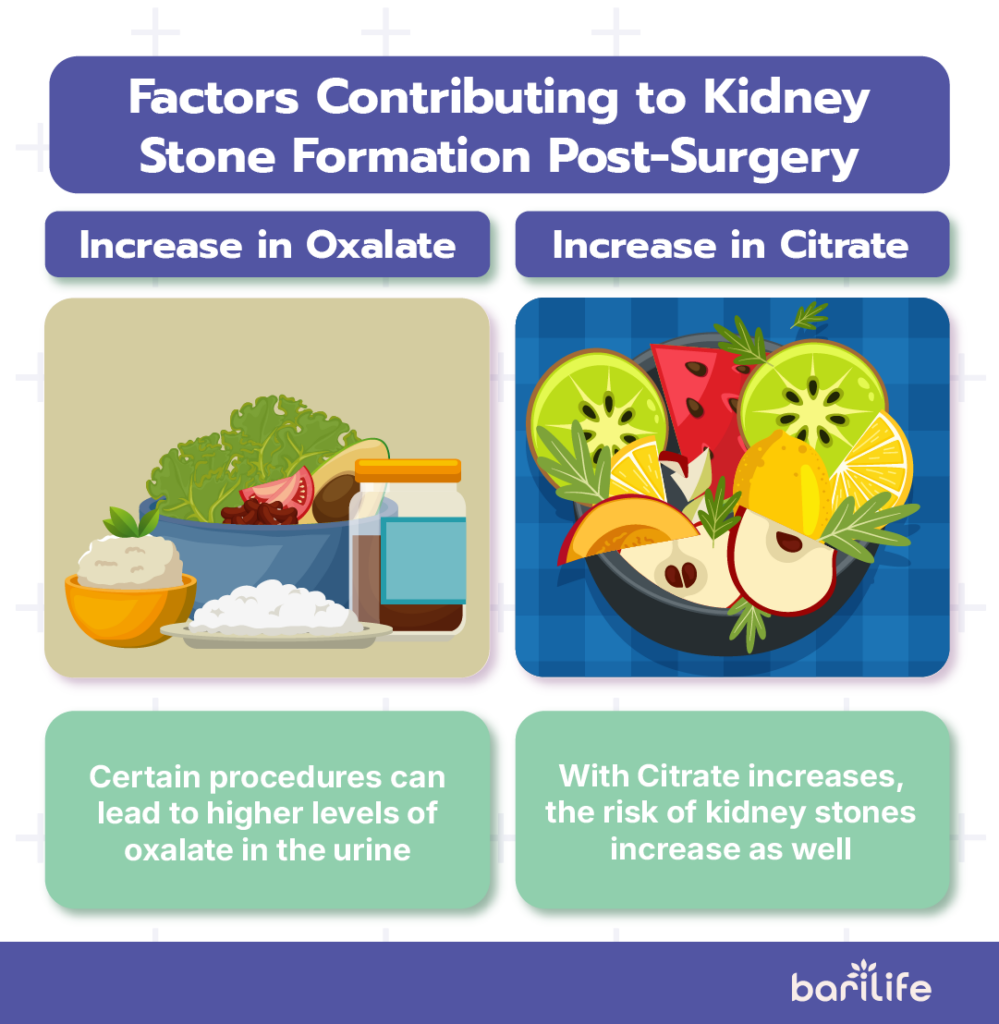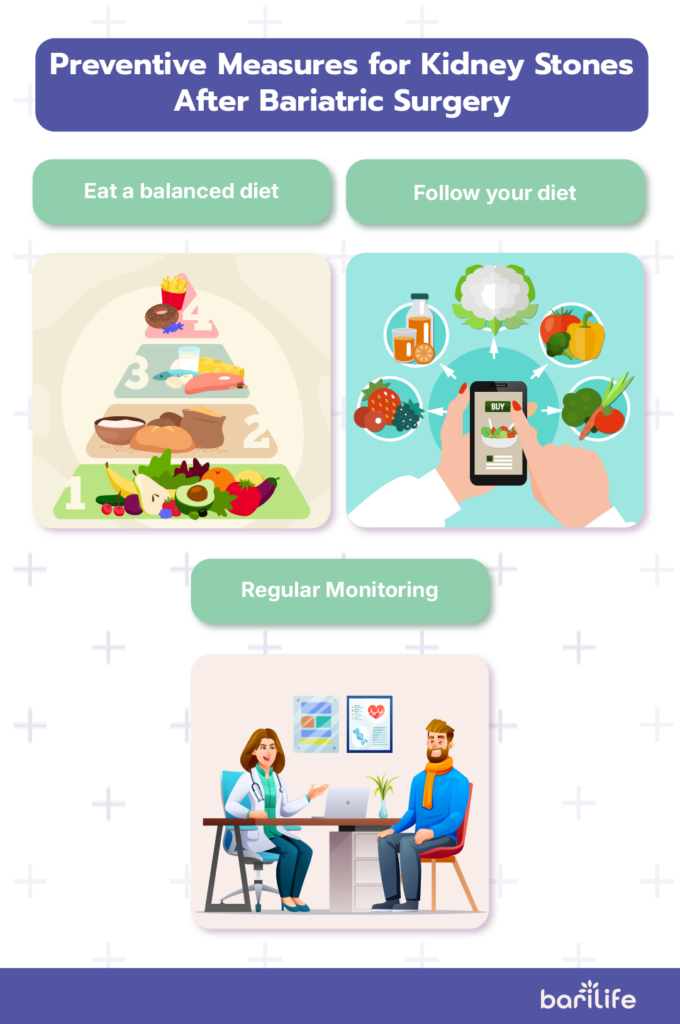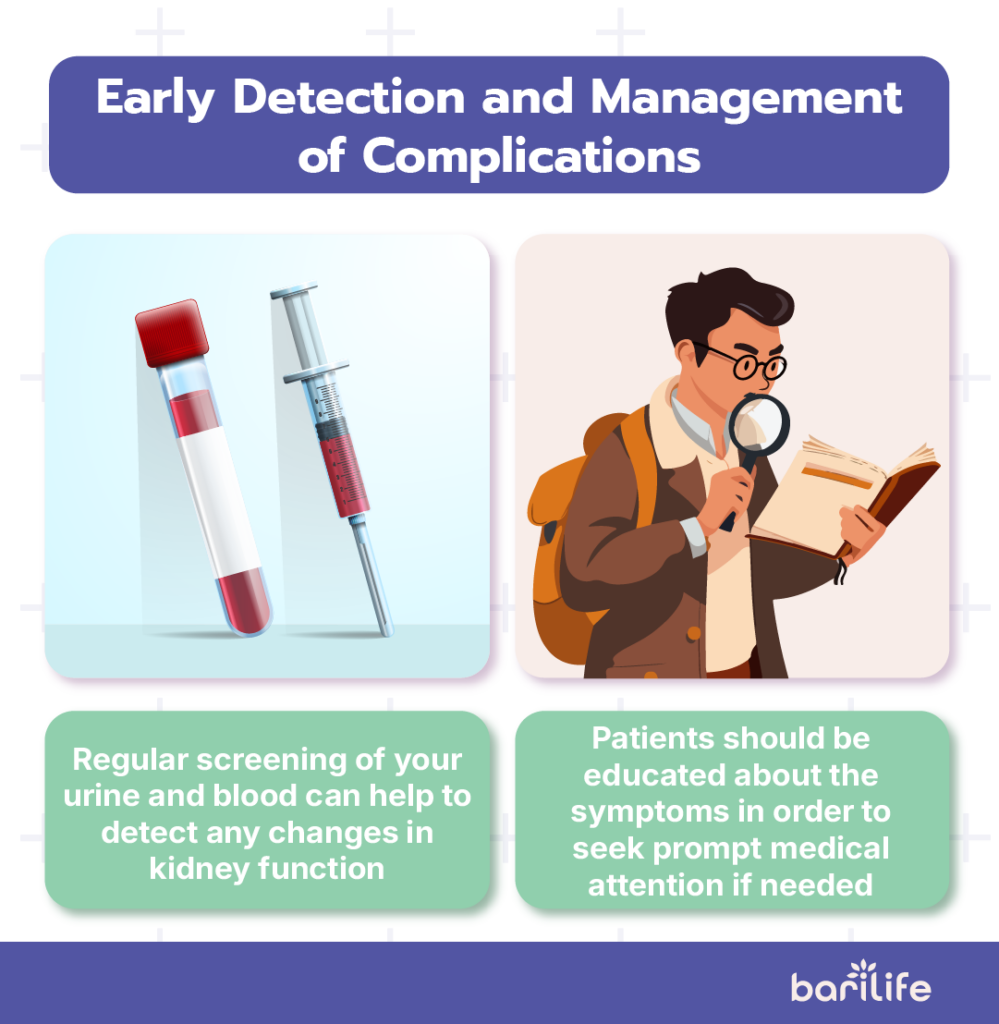Kidney stones are hard pieces that form in your kidneys. They develop when substances like calcium, oxalate, or uric acid become too concentrated in urine and stick together. Over time, these substances crystallize into stones. Sadly, kidney stones often occur after bariatric surgery. This article will explore the link between bariatric surgery and kidney stones. It will also discuss how the surgery affects kidney health, factors that cause stone formation, the role of diet, and preventive measures. It will cover early detection and management techniques, as well as psychological problems after bariatric surgery and other complications.
The Link Between Bariatric Surgery and Kidney Stones

After undergoing bariatric surgery, the risk of developing kidney stones is increased. Research indicates that within six years of the operation, about 11% of patients develop new kidney stones, in comparison to about 4.3% of obese individuals who did not get surgery. This highlights how patients who undergo bariatric surgery, especially procedures like Roux-en-Y gastric bypass have a higher likelihood of developing kidney stones.
This typically results because these surgeries cause malabsorption, which can lead to changes in the composition of urine after bariatric surgery. Because the body is not able to adequately absorb as well, these procedures can often lead to alterations in urine chemistry. These include increased oxalate levels and decreased citrate levels, both of which contribute to kidney stone formation. Supporting your nutrition with bariatric vitamins or bariatric multivitamins after surgery can help mitigate these effects.
Additionally, ulcer after bariatric surgery is another complication that may indirectly affect kidney health by altering nutrient absorption and dietary patterns. Opting for bariatric vitamins chewable can make supplementation more manageable for those experiencing discomfort after surgery.
How Bariatric Surgery Affects Kidney Health
Nutrient absorption is greatly affected by bariatric procedures. Depending on the type of surgery, this either happens directly or indirectly. Regardless, the risk of developing nutrient deficiencies is high. Procedures that induce malabsorption may result in deficiencies of calcium and citrate, both of which play roles in preventing kidney stone formation. Incorporating bariatric calcium chews into your regimen is an effective way to ensure adequate calcium intake.
Additionally, after surgery, some patients experience increased absorption of oxalate. The more oxalate absorbed, the more excess is excreted. This results in elevated urinary oxalate levels, which is a known risk factor for developing kidney stones. Other late complications of bariatric surgery, such as gallbladder removal after bariatric surgery, may also have implications on digestion and nutrient absorption, further influencing kidney stone risk.
Depending on the type of bariatric procedure, the size of your stomach may be altered. If your stomach is decreased in size, it could lead to reduced fluid intake. This could potentially cause concentrated urine, which could increase the risk of developing kidney stones. Moreover, alcoholism after bariatric surgery has been identified as a risk factor that can exacerbate hydration issues, affecting kidney health.
Factors Contributing to Kidney Stone Formation Post-Surgery
There are a few factors that can affect the risk of developing kidney stones after bariatric surgery. As discussed, the increased ability to absorb oxalate after certain procedures can lead to higher levels of oxalate in the urine. This can further promote the risk of developing oxalate kidney stones.

Conversely, the reduced ability to excrete citrate also leads to kidney stone formation. Citrate can inhibit the creation of kidney stones, but with less being excreted in the urine, the risk of kidney stones increases. For many patients, what is the most common complication of bariatric surgery is related to malabsorption issues, which can directly or indirectly increase the likelihood of kidney stones.
As previously discussed, nutrient absorption is greatly affected by the anatomy alterations that are made during bariatric procedures. Malabsorption of fats, which is common after bariatric surgery, can result in fats binding to calcium in the gut. When this happens, oxalate is left unbound and is more readily absorbed. This further increases urinary oxalate levels and raises the risk of developing kidney stones.
Dietary Influences on Kidney Stone Risk
Bariatric surgery isn’t the only risk factor for developing kidney stones. There are a few dietary factors that can play a role. First, there are many foods that contain high levels of oxalates. Consuming these foods can elevate urinary oxalate levels, and increae the risk of developing kidney stones. High oxalate foods include spinach, nuts, chocolate, etc.
Additionally, a low intake of calcium is associated with increased risk of developing kidney stones. This is because less calcium in the diet can lead to higher oxalate absorption in the intestines, as there is less calcium available to bind oxalate. This then increases the risk of developing kidney stones.
Lastly, too much sodium in the diet can lead to calcium excretion in the urine. When too much calcium is excreted in the urine, the risk of developing calcium-based kidney stones is increased.
Preventive Measures for Kidney Stones After Bariatric Surgery
If you’ve recently undergone bariatric surgery and are looking for ways to prevent kidney stones from forming, there are a few preventive measures you can take. First, be sure to stay hydrated. Adequate hydration helps to dilute the urine. This reduces the concentration of kidney stone-forming substances. As long as you do not feel uncomfortably full when drinking water, you can continue to drink more.

After the procedure, your stomach may be smaller in size, so do not push this past the point of comfort. However, make sure you are hydrated and continuously drinking water throughout the day. A good way to tell if you are properly hydrated is to check the color of your urine. Aim for a pale yellow urine to determine your hydration.
Additionally, make sure to follow the dietary recommendations after bariatric surgery. You may also want to limit the intake of high oxalate foods as well as ensure you are eating enough dietary calcium to prevent kidney stone formation.
Lastly, regular monitoring is key. Be sure to attend routine follow up appointments with healthcare providers. They will monitor kidney function and urine composition, which is crucial for early detection and management of potential issues.
Early Detection and Management of Complications
Regular screening of your urine and blood can help to detect any changes in kidney function. This will help to identify any presence of stone-forming substances. By monitoring this early you can allow for timely intervention.
It’s also important that you know what to look for when it comes to kidney stone symptoms. Patients should be educated about these symptoms in order to seek prompt medical attention if needed. Symptoms of kidney stones include severe abdominal or back pain, blood in the urine, and nausea. If you are experiencing any of these symptoms, contact your healthcare provider right away.
Timely medical intervention is critical to avoid worsening of symptoms or complications. Early treatment of kidney stones can help to prevent things like infections or even chronic kidney disease. Reach out to your doctor if you have any concerns or suspect you may have kidney stones.

Conclusion
In conclusion, both patients and providers must know the link between bariatric surgery and kidney stones. Bariatric surgery helps with obesity and its health issues. However, it also raises the risk of kidney stones. This is due to changes in nutrient absorption, urine chemistry, and diet after surgery. Therefore, proactive measures are vital. Key steps are to stay hydrated, follow dietary advice, and keep appointments. Patients should talk openly with healthcare professionals. They should stay informed about complications. This helps protect kidney health and enjoy the benefits of surgery. Proactive care and quick response to issues lead to better outcomes and a higher quality of life.

Leave a Comment
Your email address will not be published.